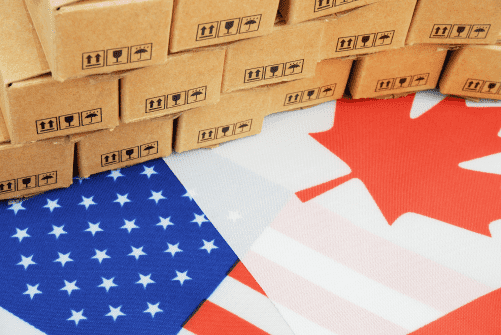
Blog
- Employer advice
Home
Resources
Employer advice

Charlie Herrera Vacaflor, Employment Law & HR Content Senior Consultant
(Last updated )

Charlie Herrera Vacaflor, Employment Law & HR Content Senior Consultant
(Last updated )
On February 10, US President Donald Trump signed orders to levy 25 per cent tariffs on all steel and aluminum entering the United States from March 12. This is in addition to the 25 per cent tariff on some imported goods from Canada, which has come into effect on March 4, 2025. As of March 12, a collective tariff of 50 per cent on steel and 35 per cent on aluminum coming from Canada is in force.
As a response, Canada put in place its own tariffs These are called surtaxes. A surtax or a tax surcharge is a tax applied on top of a previously existing tax. As of March 5, 2025, a 25% surtax will be applied on a list of US goods entering the Canadian market worth at $30 billion. Unless the bilateral commercial relationship changes, in 21 days, Canada’s surtax will apply to an additional $155 billion worth of additional US goods.
Such a trade escalation will have a significant impact on Canada’s economy. Any tariffs on the metals would drive up costs of key building materials such as electrical components and window frames. Thus, it is important that Canadian small businesses get clarity on how the new US tariffs will affect their operations and prices.
Now is the time to build resilience and take preventive steps to reduce the impact of these tariffs, such as disruption of established supply chains. Small and Mid-size Enterprises (SMEs) can also make the most of new business opportunities that may arise like demand for Canadian-made goods and supporting local economy by sourcing from domestic suppliers.
This blog looks at the benefits of pivoting to domestic suppliers and offers suggestions on how it could be done:
High tariffs mean more costs for you and higher prices for your consumers. This could result in low sales and slim profits.
By reducing dependence on US suppliers and switching to domestic ones, you could avoid the increased costs that US tariffs will bring, get raw materials at much reasonable prices, and protect your bottom line.
As the US adopts protectionist trade policies, further policy changes around tariffs may increase commercial uncertainty for your business.
Adapting towards a “Buy Canadian” approach will help minimize the risks of being unable to source or afford raw materials from unpredictable US markets.
Domestic supply chains also mean less red tape, faster shipping, and better service.
By sourcing from domestic suppliers, you protect your business from unpredictability and higher costs. You also strengthen the Canadian economy by supporting local businesses and helping create more jobs. It’s a win-win.
President Trump’s remarks about making Canada the 51st state have led to a surge of patriotism in Canada. More and more Canadians are now choosing to buy Canadian-made products, thus giving businesses that source and make in Canada an advantage over their competitors.
To switch to domestic suppliers in response to high US tariffs, first you need to evaluate your current supply chain. Identify what goods and materials you import from the US. Next look for viable Canadian alternatives, looking into factors such as price and quality. Finding new suppliers may be easier said than done. It will require research and tapping industry groups for recommendations. As you find suppliers that meet your business needs, negotiate favourable terms that work for your business and client needs.
Tariffs bring uncertainty but Peninsula can help you stay in control. If tariffs are forcing your business to pivot toward the domestic market and you anticipate gaining market share, upscaling your workforce demands precision.
To learn more about how our services can protect your business, call a Peninsula expert today at (1) 833 247-3652.
Home
Resources
Employer advice
Find out what 6,500+ businesses across Canada have already discovered. Get round-the-clock HR and health & safety support with Peninsula.
